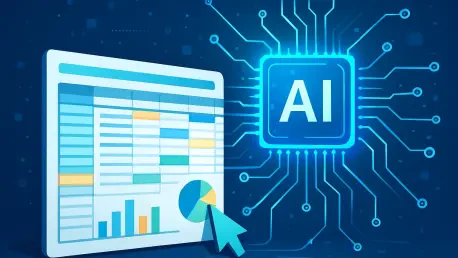In an era where data reigns supreme as the backbone of business decisions, a new wave of technology is poised to redefine how professionals manage and analyze information, with Paradigm, a startup launched in 2024 by the visionary 22-year-old Anna Monaco, leading the charge. Unlike traditional platforms such as Microsoft Excel or Google Sheets, Paradigm equips each spreadsheet cell with an autonomous AI agent capable of independently retrieving data, performing intricate calculations, and collaborating in real time. This transformative concept promises to convert time-intensive data tasks into seamless, efficient processes, potentially disrupting a market long dominated by established giants. Backed by influential supporters like Y Combinator and Dropbox, Paradigm is generating significant buzz as a contender that could reshape productivity software. This article delves into the startup’s cutting-edge technology, its impact on workplace efficiency, the competitive challenges it faces, and the broader implications for AI-driven tools in data management.
Unleashing the Potential of Agentic AI
The core of Paradigm’s innovation lies in its pioneering use of “agentic AI,” a technology that imbues each spreadsheet cell with the ability to function as an independent analyst. This means that with a simple user prompt, cells can instantly populate with detailed information—be it company profiles or financial metrics—sourced from verified web databases and real-time APIs. Such a capability starkly contrasts with the labor-intensive data entry required by conventional spreadsheet tools, where users often spend hours manually inputting and cross-checking figures. Tech industry reports have showcased demonstrations of this technology in action, revealing how it streamlines complex analysis into mere seconds. By reducing the grunt work, Paradigm is not just enhancing speed but fundamentally altering the way data interaction happens, making sophisticated insights accessible through intuitive, natural language commands.
Beyond the impressive speed, agentic AI introduces a layer of intelligence that traditional spreadsheets simply cannot match. Each cell operates collaboratively, sharing insights and adapting to user needs in real time, which creates a dynamic workspace far removed from static grids of numbers. This technology addresses a critical pain point for professionals who rely on accurate, up-to-date information to make informed decisions under tight deadlines. For instance, financial analysts or marketing teams can query a spreadsheet for competitor data or sales trends and receive comprehensive results without navigating multiple external sources. While still in its early stages, Paradigm’s approach signals a shift toward smarter tools that prioritize user efficiency over manual oversight, setting a new benchmark for what spreadsheets can achieve in data-heavy environments.
Revolutionizing Workplace Efficiency
Paradigm’s mission centers on eliminating the drudgery of repetitive data tasks, a goal it pursues with remarkable precision. Capable of populating up to 500 cells per minute with data drawn from millions of vetted sources, the platform offers unparalleled automation for tasks like enriching lead lists or compiling financial reports. This level of speed and accuracy translates into substantial time savings for professionals in fields such as sales operations, where hours spent on manual data entry can now be redirected toward strategic planning or client engagement. By minimizing human intervention, Paradigm also reduces the likelihood of errors that often plague traditional spreadsheet workflows, ensuring more reliable outputs. This focus on automation aligns with a growing demand for tools that empower users to focus on high-value activities rather than routine number-crunching.
Moreover, the ripple effects of this productivity boost extend across various industries, from startups to large enterprises. Small businesses, often constrained by limited resources, stand to gain significantly from a tool that democratizes access to advanced data analytics without requiring specialized expertise. Imagine a small marketing firm instantly generating detailed customer segmentation data that would typically demand a dedicated analyst. Such capabilities level the playing field, allowing teams to make data-driven decisions swiftly and confidently. As Paradigm continues to refine its platform through early access trials, the potential for widespread adoption grows, hinting at a future where time-intensive data management becomes a relic of the past, replaced by intuitive, AI-powered solutions that prioritize efficiency and innovation.
Challenging the Spreadsheet Titans
In the fiercely competitive landscape of productivity software, Paradigm is boldly positioning itself against heavyweights like Microsoft and Google. While Excel’s Copilot feature incorporates AI assistance for tasks like formula suggestions, it falls short of the granular, per-cell autonomy that defines Paradigm’s technology. This distinction gives the startup a unique edge, allowing for more nuanced and responsive data handling that traditional tools struggle to replicate. Industry discussions and user sentiments shared on social platforms like X highlight growing excitement for this novel approach, suggesting that Paradigm could carve out a niche despite its modest team size. With plans to expand through strategic engineering hires, the company is gearing up to challenge the status quo in a market ripe for disruption.
However, taking on industry giants is no small feat, and Paradigm must navigate a landscape where brand loyalty and entrenched workflows favor established players. Microsoft Excel and Google Sheets benefit from decades of user familiarity and integration with broader ecosystems of business tools, creating a high barrier to entry for newcomers. Yet, Paradigm’s early traction, fueled by positive feedback from initial users testing the platform through its online portal, indicates a readiness among professionals for something different. The startup’s backing from influential partners further bolsters its credibility, providing the resources needed to scale and refine its offerings. If Paradigm can sustain this momentum and prove its value in real-world applications, it might not just compete but redefine expectations for what spreadsheet software should deliver in terms of speed and intelligence.
Addressing the Hurdles of AI Integration
Despite its promising innovations, Paradigm faces significant challenges that could temper its ascent. Data privacy stands out as a critical concern, especially given the platform’s dependence on external web sources and third-party databases to fuel its AI agents. Ensuring the security of sensitive information accessed and processed by these agents is paramount to building user trust, particularly in industries handling confidential data like finance or healthcare. While the startup has implemented measures such as data traceability for each cell, the broader question of safeguarding against breaches remains a pressing issue. As AI tools become more embedded in daily operations, addressing these security concerns will be crucial to gaining widespread acceptance and avoiding potential backlash from wary users.
Another obstacle lies in the inherent risks of AI inaccuracies, often referred to as “hallucinations,” where the system might generate incorrect or fabricated data. Such errors could undermine the reliability that professionals expect from spreadsheet tools, especially in high-stakes decision-making scenarios. Paradigm counters this by prioritizing vetted data sources and offering transparency in how information is derived, yet achieving near-perfect accuracy remains a challenge across the AI industry. Additionally, the question of adoption looms large—convincing users to transition from familiar platforms to a new system requires seamless integration with existing workflows. Success in overcoming these hurdles will depend on continuous refinement and a clear demonstration of value that outweighs the risks, ensuring that the technology is seen as a trusted partner rather than an experimental novelty.
Envisioning the Future of AI in Productivity Tools
Paradigm’s emergence is emblematic of a broader industry shift toward intelligent, automated systems that redefine productivity. The concept of agentic AI, where technology mimics human collaboration by enabling autonomous task execution, is gaining ground not just in spreadsheets but across various business applications. Competing solutions are beginning to explore similar innovations, signaling the start of a competitive race to deliver the most intuitive and powerful tools. Analysts speculate that Paradigm could evolve beyond spreadsheets into a comprehensive operations hub by integrating with platforms like Zapier, creating interconnected workflows that handle complex processes with minimal oversight. This vision points to a future where AI doesn’t just assist but fundamentally transforms business operations.
This trend also reflects a growing appetite for accessible data insights, particularly among smaller organizations that lack the resources for dedicated data teams. By lowering the barrier to advanced analytics, tools like Paradigm empower a wider range of users to leverage data effectively, fostering innovation at all levels of business. The implications are profound—imagine a landscape where routine data tasks are fully automated, allowing professionals to focus exclusively on creative and strategic endeavors. As this wave of AI-driven productivity tools continues to develop, the focus will likely shift toward enhancing interoperability and user-friendliness, ensuring that the benefits of automation are felt universally. Paradigm’s journey, though just beginning, offers a compelling glimpse into how technology can reshape the mundane into the extraordinary.
Reflecting on a Data-Driven Evolution
Looking back, Paradigm’s bold integration of AI agents into spreadsheets marked a pivotal moment in the evolution of productivity software. The ability to automate real-time data tasks at unprecedented speeds challenged long-standing norms, pushing the boundaries of what tools like Excel could achieve. While hurdles around privacy and accuracy persisted, the startup’s commitment to traceability and vetted sources laid a foundation for trust. Moving forward, the path to broader impact hinges on refining these safeguards and ensuring seamless adoption across industries. As the industry continues to embrace agentic AI, stakeholders should prioritize collaboration between innovators and businesses to address lingering concerns, paving the way for a future where data management is not just efficient but effortlessly intuitive.









